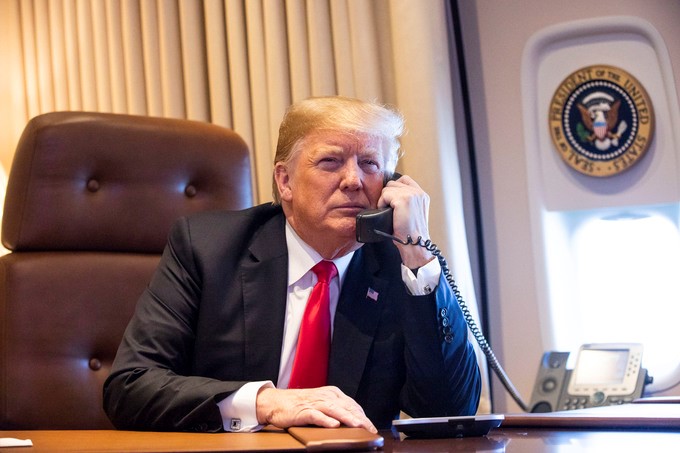Donald Trump’s relationship with Russia is once again in the spotlight as former FBI Deputy Director Andrew McCabe suggests that the ex-president could be seen as a Russian "asset," sparking renewed concerns about Trump’s connections with Moscow. McCabe, who was fired by Trump in 2018 during the FBI’s investigation into Russian interference in the 2016 election, raised these concerns during a podcast appearance, where he highlighted Trump’s unusual deference to Russian President Vladimir Putin and his questionable stance on key geopolitical issues.
McCabe’s remarks have reignited a long-standing debate about Trump’s ties to Russia, which have been scrutinized since his first run for the White House. While McCabe stopped short of labeling Trump as an “active” or “recruited” Russian asset, he pointed to multiple instances where the former president’s behavior raised red flags. These moments include Trump’s friendly interactions with Putin, his repeated praise of the Russian leader, and his controversial approach to U.S. relations with NATO and Ukraine, especially in the face of Russian aggression.
The concerns McCabe outlined are not new but are gaining renewed traction as Trump campaigns for another term in the 2024 presidential election. His critics, including McCabe, argue that his unorthodox approach to U.S. foreign policy and his coziness with authoritarian figures like Putin raise significant questions about his motives and potential vulnerabilities.
McCabe emphasized that Trump’s actions, particularly his admiration for Putin, stand in stark contrast to the behavior of past American presidents—both Republicans and Democrats—who have traditionally taken a hardline stance against Russian aggression. The former FBI official suggested that Trump’s attitude toward Russia could be explained by a fundamental misunderstanding of geopolitical dynamics, but he also left open the possibility of a deeper, more concerning relationship between Trump and Moscow.
McCabe’s concerns come against the backdrop of a broader conversation about Russia’s ongoing efforts to disrupt American democracy. The former FBI official highlighted Russia’s long-standing interest in sowing division and chaos in the U.S. political system, suggesting that Trump’s actions may have inadvertently—or perhaps knowingly—aligned with those goals. Russia’s interference in U.S. elections has been well-documented, particularly during the 2016 campaign, and McCabe warned that their desire to meddle in American politics remains a pressing concern.
The former FBI deputy’s remarks are part of a larger conversation about the potential dangers of a second Trump presidency. McCabe expressed serious reservations about what a return to the White House could mean for U.S. national security, especially given Trump’s past handling of sensitive intelligence and his approach to key foreign adversaries.
McCabe himself was embroiled in controversy during Trump’s first term, having been fired by the former president just days before his planned retirement. Trump had repeatedly attacked McCabe over his role in the FBI’s Russia investigation, which led to the dismissal of key members of Trump’s inner circle. McCabe later sued the Department of Justice and had his full pension restored after settling the lawsuit.
As Trump pushes forward with his 2024 campaign, the concerns raised by McCabe—and others—are likely to fuel ongoing scrutiny over the former president’s relationship with foreign powers and his fitness for office. Whether these concerns will resonate with voters remains to be seen, but McCabe’s warnings underscore the potential risks posed by Trump’s past and future dealings with Russia.



 Trump Says “Very Good Talks” Underway on Russia-Ukraine War as Peace Efforts Continue
Trump Says “Very Good Talks” Underway on Russia-Ukraine War as Peace Efforts Continue  U.S. Lawmakers to Review Unredacted Jeffrey Epstein DOJ Files Starting Monday
U.S. Lawmakers to Review Unredacted Jeffrey Epstein DOJ Files Starting Monday  Trump’s Inflation Claims Clash With Voters’ Cost-of-Living Reality
Trump’s Inflation Claims Clash With Voters’ Cost-of-Living Reality  Nighttime Shelling Causes Serious Damage in Russia’s Belgorod Region Near Ukraine Border
Nighttime Shelling Causes Serious Damage in Russia’s Belgorod Region Near Ukraine Border  Trump Lifts 25% Tariff on Indian Goods in Strategic U.S.–India Trade and Energy Deal
Trump Lifts 25% Tariff on Indian Goods in Strategic U.S.–India Trade and Energy Deal  Trump Signs Executive Order Threatening 25% Tariffs on Countries Trading With Iran
Trump Signs Executive Order Threatening 25% Tariffs on Countries Trading With Iran  Missouri Judge Dismisses Lawsuit Challenging Starbucks’ Diversity and Inclusion Policies
Missouri Judge Dismisses Lawsuit Challenging Starbucks’ Diversity and Inclusion Policies  South Korea Assures U.S. on Trade Deal Commitments Amid Tariff Concerns
South Korea Assures U.S. on Trade Deal Commitments Amid Tariff Concerns  Federal Judge Restores Funding for Gateway Rail Tunnel Project
Federal Judge Restores Funding for Gateway Rail Tunnel Project  Norway Opens Corruption Probe Into Former PM and Nobel Committee Chair Thorbjoern Jagland Over Epstein Links
Norway Opens Corruption Probe Into Former PM and Nobel Committee Chair Thorbjoern Jagland Over Epstein Links  US Pushes Ukraine-Russia Peace Talks Before Summer Amid Escalating Attacks
US Pushes Ukraine-Russia Peace Talks Before Summer Amid Escalating Attacks  Iran–U.S. Nuclear Talks in Oman Face Major Hurdles Amid Rising Regional Tensions
Iran–U.S. Nuclear Talks in Oman Face Major Hurdles Amid Rising Regional Tensions  Trump Endorses Japan’s Sanae Takaichi Ahead of Crucial Election Amid Market and China Tensions
Trump Endorses Japan’s Sanae Takaichi Ahead of Crucial Election Amid Market and China Tensions  Pentagon Ends Military Education Programs With Harvard University
Pentagon Ends Military Education Programs With Harvard University  U.S.-India Trade Framework Signals Major Shift in Tariffs, Energy, and Supply Chains
U.S.-India Trade Framework Signals Major Shift in Tariffs, Energy, and Supply Chains  Trump Backs Nexstar–Tegna Merger Amid Shifting U.S. Media Landscape
Trump Backs Nexstar–Tegna Merger Amid Shifting U.S. Media Landscape 































